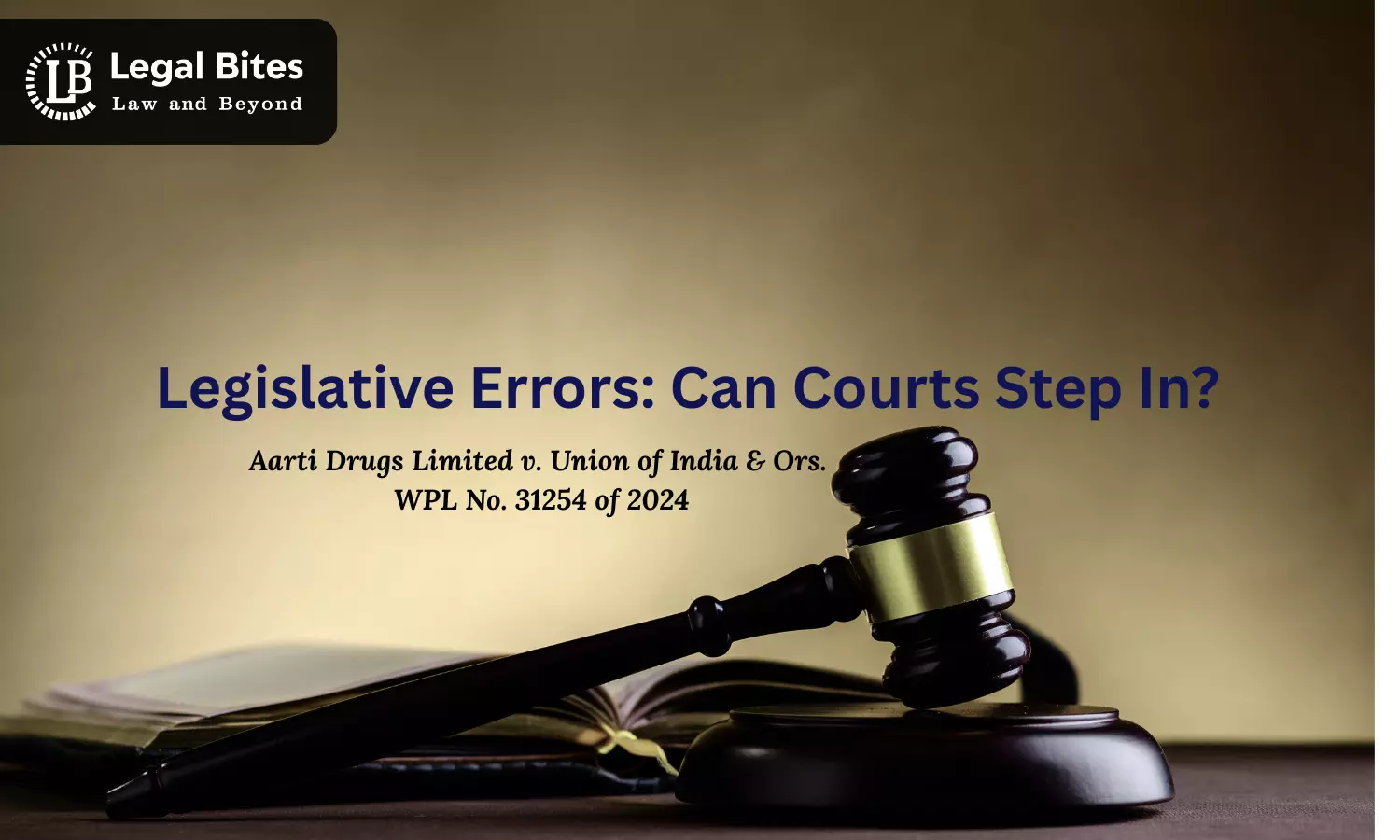Can Courts Direct Retrospective Correction of Legislative Mistakes?
Bombay High Court rules that courts cannot compel retrospective correction of legislative errors. Explore the legal boundaries of judicial power.

In a constitutional democracy governed by the separation of powers, the boundaries between legislation, execution, and adjudication are sacrosanct. Courts exist to interpret and apply laws, not to legislate. However, disputes often arise when litigants seek judicial intervention to rectify what they consider to be legislative or clerical “mistakes.” The Bombay High Court in Aarti Drugs Limited v. Union of India & Ors. recently adjudicated one such pertinent issue. (WPL No. 31254 of 2024, decided on 07 July 2025), where the petitioner sought the retrospective correction of a customs tariff error. This case brings forth significant jurisprudential questions: Can courts correct legislative mistakes? More importantly, can they compel retrospective application of such corrections?
This article explores the case in detail, unpacks the underlying legal principles, and evaluates the boundaries of judicial power in the context of legislative correction.
Background of the Case
Aarti Drugs Limited, the petitioner, approached the Bombay High Court seeking correction of an alleged “clerical error” in the customs tariff under sub-heading 293359 of Chapter 29 from the Third Schedule of the Finance Act, 2022. The error, according to the petitioner, led to the Basic Customs Duty (BCD) being fixed at 10% instead of the correct rate of 7.5%.
The petitioner claimed that this error was acknowledged and eventually rectified by the Union of India and the Central Board of Indirect Taxes and Customs (CBIC) in notifications dated 1 February 2025 and 1 May 2025. However, the correction was made effective prospectively, which prompted the petitioner to seek judicial intervention to enforce it retrospectively from 1 May 2022—the original date from which the duty became applicable.
The reliefs sought were:
- A writ of certiorari to correct the records and the omission.
- A writ of mandamus to enforce the correct tariff retrospectively.
- A direction to the respondents to decide upon the petitioner’s representation dated 23 March 2024 seeking revision of the BCD.
Petitioner’s Arguments
The petitioner argued that:
- The omission of the sub-heading in the 2022 Schedule was patently clerical and not a deliberate legislative choice.
- The subsequent correction vindicated this position and justified a retrospective application.
- The delay in correction caused financial loss to the company, which would be remedied by retrospective rectification.
- The Court should exercise its constitutional powers under Article 226 to correct the anomaly and restore justice.
Government’s Counter
The Respondents, represented by Mr. Jitendra B. Mishra, opposed the petition by citing the doctrine of separation of powers. The key contention was:
- Once the Parliament enacts a rate of duty through the Finance Act, it becomes an authoritative expression of legislative will.
- Courts cannot override or rewrite legislation, regardless of whether the omission is claimed to be a clerical or substantive error.
- Reliance was placed on the Supreme Court decision in Amin Merchant v. Chairman, Central Board of Excise and Revenue, 2016 (338) E.L.T. 164 (SC), where the Court held that once a law is enacted by Parliament, its contents are not open to judicial amendment.
Key Judicial Observations
1. Jurisdictional Boundaries
Jurisdictional boundaries refer to the limits placed on the powers of different branches of government under the Constitution. In this context, the Bombay High Court emphasised that courts cannot interfere in the legislative domain by directing corrections or amendments to laws, even if those laws contain apparent errors.
The role of the judiciary is restricted to interpreting laws and striking them down only if they are unconstitutional. Any correction, whether clerical or substantive, must be made by the Legislature itself. This clear separation of powers ensures that the judiciary does not overstep its constitutional role and respects the autonomy of the legislative process.
2. No Judicial Remedy for Clerical Errors
The Court rejected the plea that it could correct the customs tariff through a writ of certiorari or mandamus, observing that such reliefs are not ordinarily available for alleged clerical errors in statutes.
3. Legislative Corrections Must Be Prospective
The Bench ruled that even if the government subsequently amends or corrects a tariff, it is not bound to make the changes retrospective. They stated:
“It is ordinarily not for this Court to direct that such changes must be given a retrospective effect... All this would amount to encroaching on the domain primarily reserved for the Legislature by our Constitution.”
4. Petitioner’s Representation
Although the Court refused to grant reliefs (a) and (b), it permitted a request to the Union and CBIC to dispose of the petitioner’s representation dated 23 March 2024, along with a supplementary representation, “within a reasonable period.” However, this was not a formal mandamus but a judicial courtesy.
Key Highlights of the Judgment
Justices M.S. Sonak and Jitendra Jain emphasised that the role of the judiciary is confined to interpreting the law. They observed:
"Normally, it is not for this Court to rule on what the Petitioner describes as errors, obvious errors or clerical errors in a legislative instrument. In any event, it is not for this Court to issue directions for corrections of the so-called errors. The Courts interpret the laws enacted by the Legislature. They may, if a case is made out, strike down a law if it is ultra vires the Constitution. But they do not encroach upon the domain of the Legislature by directing it to enact a law or to correct what they believe may be errors in such enacted law."
Legal Analysis
A. Separation of Powers Doctrine
The judgment reinforces the principle that law-making is the exclusive prerogative of the legislature, while courts are guardians of legality and constitutionality. Article 50 of the Indian Constitution enshrines this separation as part of the basic structure, and any judicial encroachment into legislative functions is constitutionally impermissible.
B. Retrospective Legislation: Who Can Enforce It?
Retrospective legislation has significant fiscal and policy implications. Only the legislature has the authority to make laws retrospective. Courts may interpret a provision to be retrospective only if it is declaratory, clarificatory, or remedial, and if such an intention is evident in the statute. In Aarti Drugs, the High Court rightly refrained from attributing retrospectivity without express legislative intent.
C. Judicial Review v. Judicial Overreach
The judgment is a textbook application of judicial restraint. While courts have broad powers under Article 226 to issue writs, these powers are subject to constitutional limitations. In the absence of constitutional infirmity or legislative incompetence, courts must not mandate legislative actions.
Comparative Jurisprudence
1. India
In State of Rajasthan v. Basant Nahata (2005) 12 SCC 77, the Supreme Court held that:
"A court cannot add something to a statute which is not there. Interpretation must rest on the plain reading of the text."
Similarly, in S.R. Chaudhuri v. State of Punjab (2001) 7 SCC 126, the Court emphasised that even interpretation must not become legislation.
2. United States
The U.S. Supreme Court in Lambert v. Yellowley, 272 U.S. 581 (1926), observed:
"The judicial department has no power to impose legislative policies."
3. United Kingdom
In Pickin v. British Railways Board [1974] AC 765, the House of Lords held that courts cannot challenge the validity of an Act of Parliament, let alone modify it.
Practical Implications
The Bombay High Court’s decision offers important takeaways:
- Legislative Errors Must Be Raised Through Proper Channels: Stakeholders must pursue policy-based representations or review petitions before the government, not courts.
- Tax and Duty Matters Demand Caution: Fiscal statutes like the Finance Act involve complex calculations and deliberate policy choices. Courts avoid interfering unless fundamental rights are violated.
- Remedy via Representation: The court’s direction to “consider” the petitioner’s grievance allows an administrative door to remain open while preserving judicial discipline.
Conclusion
The Bombay High Court, in Aarti Drugs Ltd. v. Union of India, has reaffirmed a crucial constitutional principle: courts cannot compel retrospective corrections of legislative enactments. While the desire to correct perceived injustices or anomalies is understandable, the remedy lies within the domain of Parliament and executive authorities, not the judiciary.
This ruling serves as a reminder that judicial intervention has limits, particularly where legislative competence and fiscal policy are concerned. The sanctity of parliamentary enactments, even if flawed or delayed in correction, cannot be undone by judicial fiat—except where constitutional boundaries are crossed.

